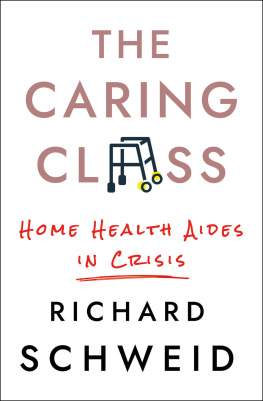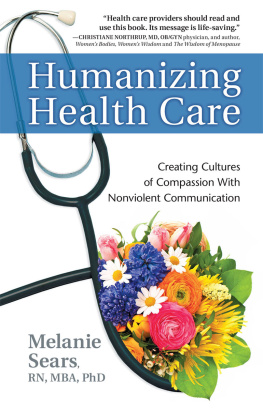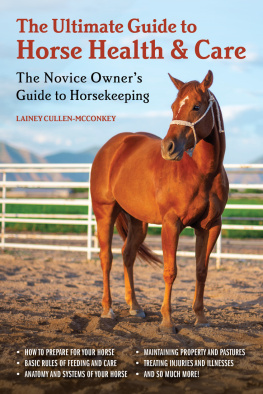I NTRODUCTION
To write a book is to undertake a journey, and when this one began, I had a mistaken notion about where it was headed. I thought I would be writing about cooperative farms and businesses around the world and their worker-owners: people like the 5.6 million ejido members who farm more than half of Mexicos arable land, or the eighty thousand members of the Mondragon cooperatives in Spains Basque country who own the factories, banks, universities, and businesses where they work.
When I began to research cooperatives in the United States, I quickly learned that not many existed, and that the largest one was Cooperative Home Care Associates (CHCA), a home health care agency located in the South Bronx, which provided home health aides to elderly and disabled Medicaid recipients. I read that in 2014 the agency had more than two thousand employees, over a thousand of whom owned a share of the business.
One thing led to another, as it often does. In the spring of 2017, when I was visiting my sons family in Princeton, New Jersey, I took the train into Manhattan one morning and made my way by subway from Pennsylvania Station in the heart of the city to CHCAs offices in the South Bronx. It took an hour to get there from midtown. I was late to my meeting with Michael Elsas, who was stepping down as president of the cooperative after seventeen years. He was kind enough not to mind my tardiness. After we spoke for a while, he suggested I sit in on a training class for prospective home health aides (HHAs), as part of my introduction to the agency.
I expected to spend an hour or so listening to the details of something as boring as the instructions for any minimum wage jobhow to mop floors or cook hamburgersbut that first class astonished me. The days lesson was infection control, and it became clear that the trainees were learning not how to clean floors or fry food but rather how to help our elders stay alive, a job they would be expected to do for minimum wage.
At the same time that about 2.3 million HHAs were paid to do this work every day in the United States,
As baby boomers age, about ten thousand Americans turn sixty-five every day.
Most Americans over sixty-five want to grow old at home, but the reality is that to do so, the majority of us will eventually need someone to help with what are called activities of daily living (ADLs), those things basic to maintaining life like eating, bathing, and using the toilet, and with the instrumental activities of daily living (IADLs), such as cooking and cleaning.a whole. We need to think about how we can treat HHAs as an important part of a health care team rather than as domestic help.
Like other parts of our health care system, home care is tailored for private enterprise. As first hospitals, then nursing homes, lost their glow for investors, home health care has become ever more attractive to equity fund managers. Home care, as it is currently practiced in the United States, can deliver hefty profits, and it is one of the fastest-growing sectors of our economy. The largest home care franchises have annual revenues of more than a billion dollars.
While many agency owners reap outsized profits, the women who work for them often have trouble just keeping their families fed. Given the low pay and stressful work, it is not surprising that HHAs have one of the highest turnover rates of any job. In fact, before COVID-19 erupted in 2020, agency owners were virtually unanimous in declaring that finding and retaining aides was their biggest problem, and that it was becoming more difficult every year. At the same time that the number of elderly citizens needing help with their lives increased, the number of aides available to provide it was decreasing.
A benchmark survey of seven hundred agencies found that turnover rates in 2018 had risen an astonishing 15 percent over 2017, and a median of 82 percent of the home care workforce was not in the same job after a year. Of the agencies surveyed, 63 percent were franchises, and 28 percent were independent operators, with the rest affiliated with hospitals and other networks. A majority of the agencies surveyed reported that they had been forced to turn away business during the year because of staff shortages, according to an analysis of the data by Home Health Care News.
When I was writing this book in 2019 the nation was enjoying a strong economy. In many states, the minimum wage was rising, and the problem of turnover in the home care industry was steadily worsening as it grew ever easier to leave one job and find another. This situation was upended by COVID-19, as were so many other aspects of life. With so many people suddenly unemployed and staying homewhere they could act as caregiversthe demand for aides decreased temporarily. Depressions, recessions, and economic downturns do not last forever, however, and it is certain that as the unemployment figures improve, home health agencies will find themselves again with a shrinking labor pool and the same turnover problems. In addition, many older survivors of COVID-19 who were previously living independently may have lingering effects from the illness and may need help with their ADLs, adding to the demand for HHAs.
When I came to CHCA in 2017, unemployment was low. The pandemic was still three years in the future and even in the South Bronx, the poorest part of New York City, minimum wage work was not too hard to find. The women in that CHCA class could have chosen a much less stressful job, or no job at all; most of them had kids and were eligible for some kind of public assistance. Why, I wondered, would they want to spend their workdays bathing frail elderly people, taking them to the toilet, tolerating their bad moods, changing their diapers, or dealing with their dementias, all for minimum wage?
I was intrigued and signed on for CHCAs next month-long training class, envisioning it as an experience that I would weave into a book about cooperatives around the world. Yet as I learned about the lives of my fellow trainees and the jobs they were learning to do, I came to realize that what I wanted to write about was home health care and the women who do it; to try and present my classmates, and the millions of others doing this hard work, to the wider world of readers.
This book follows the same trajectory that I did. As I got to know the trainees, and began to learn about the actual chores that their job would entail, I also began to see what was wrong with our current system of providing home care to the elderly and how those deficiencies might be remedied. Indeed, the problems are pressing: if we do not modify the current system soon, it is likely that more and more people will be increasingly priced out of home care, and they will suffer more and die earlier than is necessary.
For many of us, it is rewarding to care for those near and dear as they approach the end of their lives. After all, we make formal or informal commitments to our spouses and our families that well be there for them when they need us. The time spent making a loved ones life easier in the final years, being by his or her side, can bring a lot of satisfaction. But the double burden of that cares financial strain and the time required to assist an individual who needs help performing ADLs and IADLs can rob us of that satisfaction. It can also poison our relationships with other family members and render our loved ones final years tremendously stressful for all concerned. This is neither a good way to live nor a good way to die, and it doesnt have to be this way.







